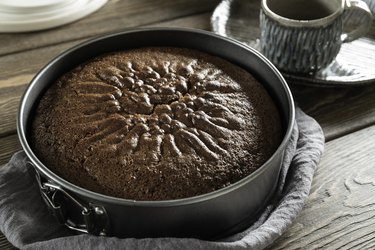
Cooling cakes overnight is a gamble because they can spoil. Certain cakes are more likely to spoil than others, though. One benefit of leaving them out overnight is that your kitchen will likely have a sweet, pleasant smell in the morning!
Tip
Some cakes can be stored at room temperature for one or two days, but those with dairy products in the icing or filling should be refrigerated.
Video of the Day
Cooling Cakes Overnight
Cake is a delicious dessert that can be made in a variety of different ways. Many cakes have a flour-based component that's layered and covered in icing. However, there are different forms of icing, fillings, toppings and layers that make baking cakes an art.
Video of the Day
Read more: Low-Sugar Sweet Potato Chocolate Frosting
Depending on the complexity of the recipe, a cake can be quite difficult to prepare. Sometimes, you may want to opt for a boxed cake for simplicity.
The layers of the cake require careful measurements to make sure they're not too moist or too dry. Then, you have to properly bake the layers. The icing is no different — and spreading it on the layers of the cake calls for a careful touch.
If you've crafted your cake perfectly, you might let it sit overnight. That lets the cake cool, which sets the icing and prevents the layers from sliding onto each other. You might also notice that your cake falls apart when taking it out of the pan if it's still warm. Letting it cool is the best way to get your cake out of the pan without falling apart.
Read more: Pumpkin Chocolate Chip Bundt Cake
Food Contamination of Cakes
Cooling cakes overnight is not always safe, though. Icings and fillings need to be refrigerated, according to Colorado Farm to Table. Those made with dairy products like cream or milk can spoil if left out.
Some fillings and icings also contain eggs. Raw or improperly cooked eggs may contain salmonella and cause foodborne illnesses, warns the Centers for Disease Control and Prevention (CDC).
Colorado Farm to Table points out that improper handling after baking may lead to contamination. Putting your cake out to cook on an unclean surface or touching it with unclean hands can expose it to bacteria. If you choose to leave your cake out overnight, make sure you put it on a clean counter.
Another way to reduce the risk of contamination is to cover the cake. You may put aluminum foil or plastic wrap over the cake to seal it from outside elements.
Covering it up will also help retain some moisture in the cake. Just make sure that the cake is completely cooled before you add plastic wrap because it can cause condensation if it's still warm.
Read more: How Do I Make a Cake Extra Moist?
Dangers of Uncooked Dough
Another problem that can make it dangerous to leave your cake out is improper cooking. Leaving the dough of the cake uncooked may lead to contamination, even if you didn't add eggs to the flour mixture.
The flour itself is susceptible to microbial growth, according to the Centers for Disease Control and Prevention. Bacteria like E. coli are not killed during the production process, so it doesn't matter if your flour has been bleached and ground. These pathogens can be introduced in the field or factory, so you should never eat raw cake batter.
The Safe Home Food Storage Guide from the Texas Agricultural Extension Service notes that certain store-bought cakes can be left out for one to two days. These include fruit cake, cheesecake, chocolate cake and angel food cake. Those that contain whipped cream, butter, cream and cream-based filling or icing should be refrigerated for safety purposes.
Read more: How Many Calories Does A Piece of Cake Have?